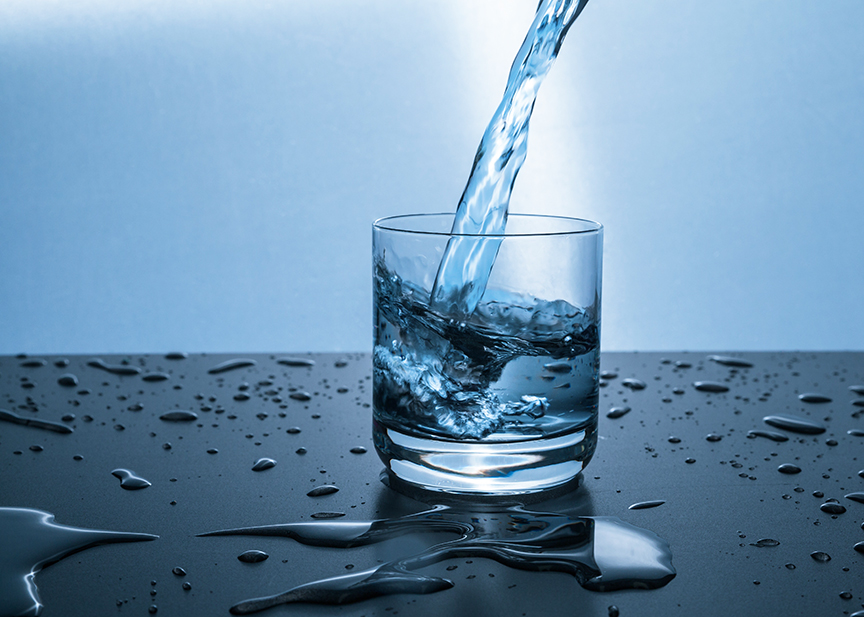Even though our body is 65-70% water, not many people recognize that water is a vital nutrient for the body. Just as oxygen is vital for your life, so is water.
Why is water important?
Just as the car burns gasoline to move, your cells burn glucose to form ATPs (the only form of energy that your cells can use). In this process, a lot of cellular waste is generated, such as carbon dioxide (Co2), urea and ammonia. This waste is very toxic to cells, so it is important for your body to get rid of it. Thankfully, your body can use your lungs, liver, kidney and skin to do just that.
- Your lungs get rid of most of the Co2 through your breath.
- Your kidneys get rid of the urea and ammonia. Urea and ammonia are so toxic that they actually kill the cells they come in contact with. Your kidneys have a lot of cells and some of these cells die when the very concentrated form of urea passes through them. But nature has been so generous to us, that even if 75% of the kidney or liver cells die, your body can still maintain its regular function.
- Water acts as a carrier to transport this waste out of the body and also dilutes the toxicity of this waste. When the ammonia and urea are diluted, they are not as toxic to the cells and your cells don’t die as much. Your preserve the kidney function.
- The SOLUTION to pollution is DILUTION!
Are you drinking enough water?
Your body provides you with signs that will indicate if you are drinking enough water:
- Pee
One simple test to know if you are drinking enough water to rid your body of toxins is to look at the colour of your pee.- If your pee is dark yellow, or reddish you are extremely dehydrated;
- If it is yellow or straw coloured, you are dehydrated;
- If it is clear (colour of water), your cells are happy and are thanking you. This is what you want to see – your body is well hydrated and is performing its normal function.
- Sometimes you may notice that your pee is red when you eat lots of beets (that is normal-do not panic!)
- Energy
When you drink enough water you will have a surge of energy! Water is used in the chemical reaction to produce ATPs (the only form of energy that your cells can use). Whenever you provide your body with oxygen (through deep breathing) and water, you will immediately notice a rise in energy and a decrease in hunger. - Poop
When you are drinking enough water your digestive system will work like clockwork. You will be able to poop at regular intervals and every day. Constipation will become unknown to you even on days when you don’t get enough fibre! - Colds, sinus trouble and other respiratory difficulties
When you provide enough water to your body you will never suffer from colds, stuffy nose, sinusitis, flu or other respiratory difficulties. Your breath flows easily when you are hydrated. Personally, I have experienced this – on days when I don’t drink enough (3L) water I experience a dry nose or a sore throat or even cold during flu season. My body has become very sensitive to even a minor amount of dehydration.
How much water should I drink?
Very few people can identify thirst, so usually, we don’t recommend everybody monitor by thirst. Some people mistake thirst signals for hunger. So we are providing you with a number to take the guesswork out!
Your body needs 2 to 4 litres per day depending on your activity.
Everyday body expels:
- 1 to 1.5 liters (L) of water through kidneys in the form of urine
- 600mL to 800mL through the skin in the form of sweat (in summer this may go up to 2L)
- 400mL to 500mL through lungs while we exhale
We have to replenish 2.5L to 3L of water that is lost everyday
You can experiment and see how much water is needed to get your pee clear. For me, it is 3 to 4L depending on my activity and time of the year (summer or winter months). I have created a habit of drinking 3 litres unconsciously no matter where I am. I drink 1.5L as soon as I get up (it doesn’t matter even if I get up in a different time zone).
How and when should I drink water?
I bet you have asked yourself at least one, if not all of these questions:
- Should I drink water 2 hours before eating or should I drink 2 hours after eating?
- Is it bad to drink during meals?
- Is drinking cold water okay or does it have to be body temperature?
- Is drinking from a plastic bottle okay or should I use a steel or copper vessel to make the water energetic?
- Should I use BPA free water bottles?
- Is it ok to drink water right before going to bed?
- Is it ok to drink water from a heated plastic bottle left out in the sun?
- Is it ok to flavour water?
We tend to boggle our minds with all these questions and invest our energy to do things in the right way.
While these are all interesting questions, they are not the most important ones. What’s the use of focusing on the type of bottle you are using if you don’t end up drinking enough water required by your body? The important question is to ask yourself whether you are drinking enough water. It doesn’t matter what way you are drinking it or when you are drinking it!
DRINK the WATER !!!
Once you have established the habit of drinking enough water, you can fine-tune your way of consuming it.
The other question that comes up is – does drinking tea, coffee, or pop count towards my water consumption?
When you drink water on an empty stomach it only takes 15 to 20 mins time to join the blood. All the other drinks e.g, fruit juices, processed juices, tea, coffee, pop take 2 hours to digest like normal food. Only water has the ability to clean our internal system and external body.
When the water level is low in our body, we lose electrolytes and potassium. All the waste materials like Urea, creatinine, phosphates, and other waste material containing nitrogen accumulates in the blood, because of insufficient water. The food taken by cells is not converted into energy. When dehydration is severe you may experience the symptoms of dry mouth, headache, dizziness, increased heartbeat, shortness of breath, tiredness, scanty yellowish coloured urine and foul smell in urine.
How should I store the water?
It is better to store water in Earthen pots or Copper vessels. If that is not available it can be stored in glass or steel vessel. When water is stored in plastic containers, it takes on the smell of plastic
Again the important question is to ask yourself whether you are drinking enough water. It doesn’t matter what way you are storing it or whether you are drinking it hot or cold or flavoring with lemon!
Happy drinking to all of you!
Wish you the best of Health and Happiness,
Dr. Shobha Rayapudi
P.S Don’t DRINK and DRIVE – that’s what 5-year-old Shakthi used to say when I was drinking water in the car 😂





0 comment
LEAVE A REPLY HERE
Your email address will not be published.